The Nissan Juke is a small SUV that started in 2010. It looks different and a lot of people like it. It was one of the first small SUVs of its kind.
In 2017, Nissan stopped making the Juke in the United States, which made some people sad. But, it is still made and sold in other countries. After halting the Juke, Nissan made a new SUV called the Nissan Kicks in the U.S. It looks more normal.
If you want to buy a used Juke, be careful. Some years of the Juke could be better because they have problems. This article will tell you which years of the Juke could be better to buy.
Which Nissan Juke Years to Avoid and Why?
The Nissan Juke years you should avoid buying them because they have many problems:
- 2011 Nissan Juke
- 2012 Nissan Juke
- 2013 Nissan Juke
- 2014 Nissan Juke
These years of the Juke could be more reliable, and there are a lot of complaints.
2011 Nissan Juke
The 2011 Nissan Juke has many problems. People who own this car have complained a lot. CarComplaints says there are 236 complaints, and the car had to be called back thrice for repairs. The biggest problems are with the turbo part of the car breaking, the engine stopping, and the car not using fuel well.
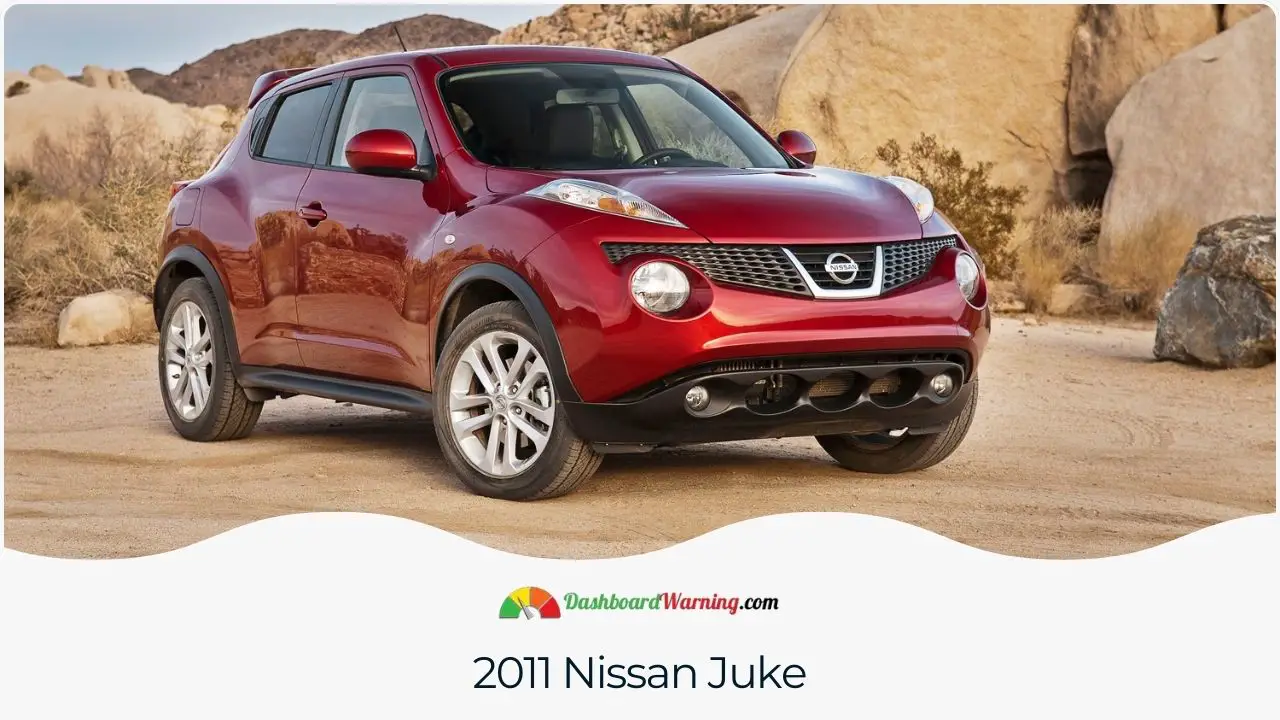
A big problem is the turbo breaking around 89,000 miles. Fixing this can cost about $2,840. A car owner in California heard a very bad noise from her car at 57,000 miles. The car mechanic said the turbo part was broken, and it was the car maker's mistake. Fixing it would cost $3,350.
Another big problem is the engine. It can leak oil or completely break. One person said their car's engine and turbo broke at 90,000 miles. The car had been using too much oil for a long time, but even though they told the dealer, everything was fixed once the engine stopped working. They were told it would cost $6,000 to repair.
Because of these big problems, it's best to avoid buying the 2011 Nissan Juke.
2012 Nissan Juke
The 2012 Nissan Juke is not a good choice either. CarComplaints shows that this model has 145 complaints, which must be recalled four times.
The biggest problem with this car is the electrical system, which can cause the engine not to start. There are 16 reports of the vehicle not starting at random times. Some people said it happened after the vehicle was unused for a few days. One person was upset because their car wouldn't start even though the battery, starter, and alternator were all okay. This problem would happen occasionally, but it could be okay for weeks once the vehicle was started.
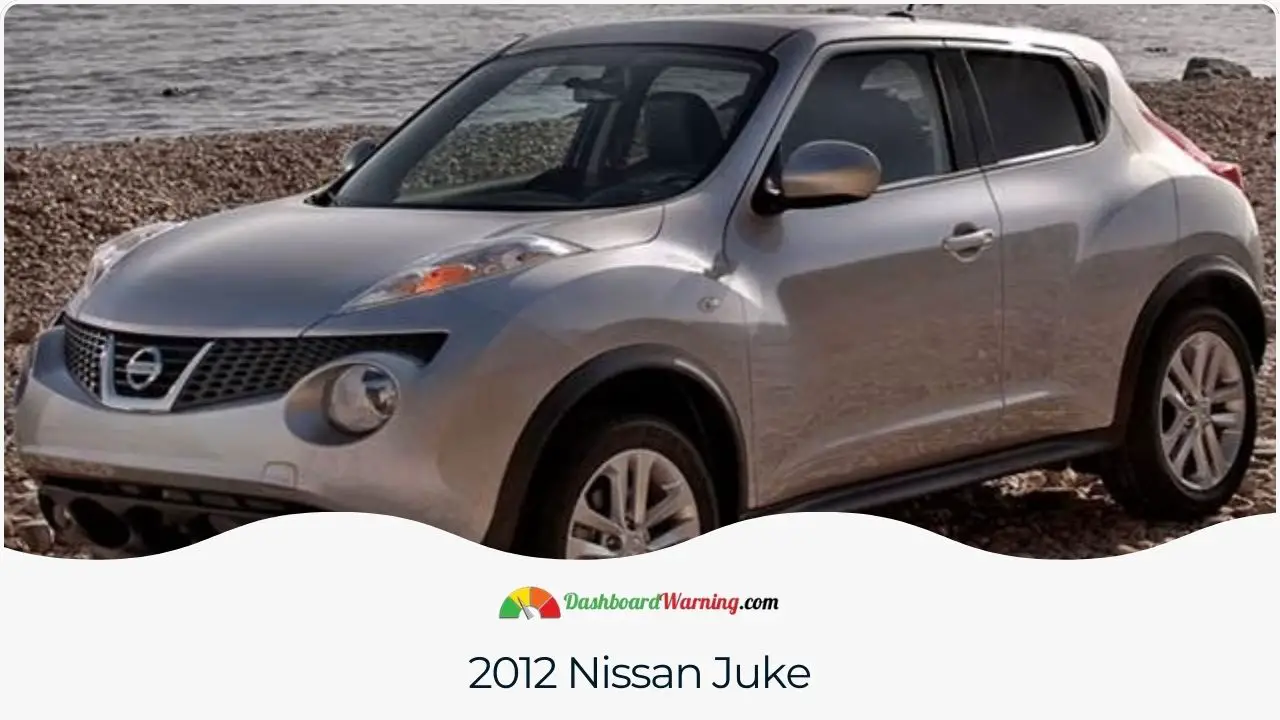
The 2012 Juke also has problems with the transmission, like making noises and failing. One car owner talked about a loud noise and the car's speed changing on its own while driving. The car dealership found out the automatic transmission was broken and needed to be replaced. This problem with the transmission is something that happens a lot in Nissans.
Lastly, the 2012 Juke has engine problems, too, especially with the engine timing belt. Of 148 complaints to the NHTSA, 62 are about engine problems, mainly faulty timing chains. One person said their car's timing chain made a noise, which caused a hole in the timing cover and led to an oil leak. They also found oil on the ground. Before this, the car would stop working suddenly, even at traffic lights.
So, buying a 2012 Nissan Juke could mean facing these serious issues.
2013 Nissan Juke
The 2013 Nissan Juke has even more problems than the 2012 model. According to CarComplaints, there are 167 complaints and two recalls for the 2013 Juke.
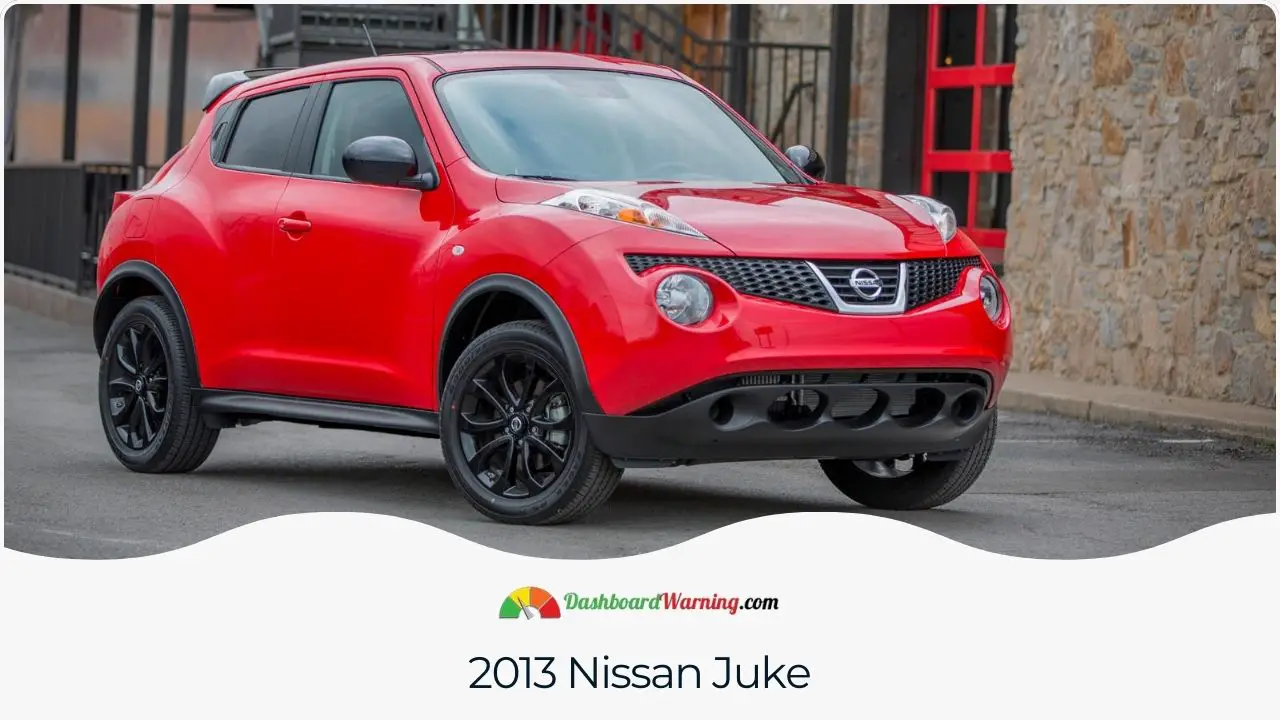
The biggest issue with this car is the transmission system, which could be better. An owner talked about hearing a whining noise, a problem with the transmission. They even found small pieces of metal in the transmission, showing it was badly worn.
Also, this model year needs help with the turbochargers not working right. A car owner said their turbocharger stopped working at 85,000 miles. The car almost didn't move, was close to stopping, and gave off black smoke. It cost about $2,500 to fix.
With the transmission and turbocharger problems, it's best to avoid buying a 2013 Nissan Juke.
2014 Nissan Juke
The 2014 Nissan Juke is also a model to avoid, mainly because of its transmission problems. CarComplaints has more than 100 complaints and two recalls for this year.
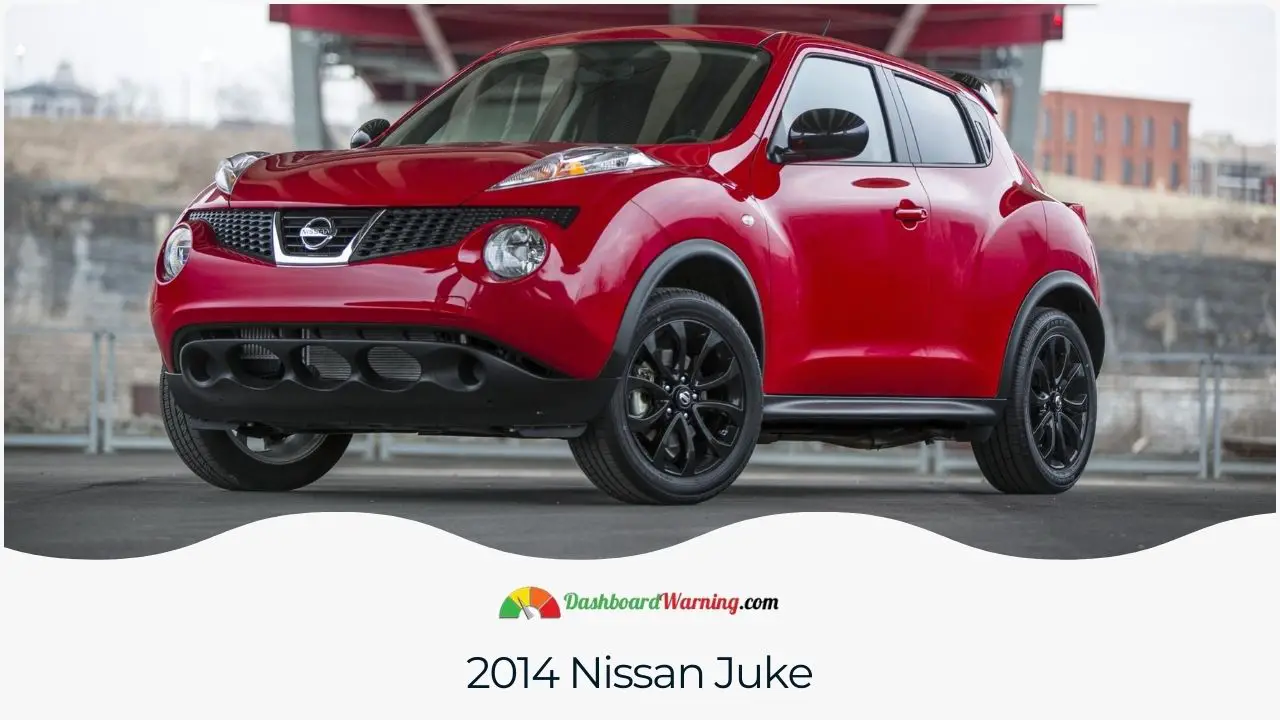
People have reported that the transmission broke down at 63,000 miles and again at 93,000 miles, which also caused problems with the turbo. One dealer said it would cost $7,500 to fix it. That's so expensive you might consider buying a different car instead. Another person mentioned that they were on their third transmission. The first one failed at 56,000 miles but was replaced under warranty. Then, at 140,000 miles, they needed another new transmission.
It's a good idea not to buy the 2014 Juke to avoid the hassle and cost of fixing the transmission.
You can also read our articles titled Nissan Armada Years To Avoid and Nissan Sentra Years To Avoid to learn more about the years to avoid in these models.
Frequently Asked Questions About Nissan Juke
- Which Nissan Juke model years should I avoid?
You should avoid the 2011, 2013, 2014, 2015, and 2016 model years due to significant engine and transmission issues. - What are common problems with the Nissan Juke?
Common problems include turbocharger failures, transmission issues, and electrical malfunctions across various model years. - Is the Nissan Juke reliable?
The Nissan Juke has mixed reliability ratings, with some years being more problematic than others, particularly the earlier models. - What issues are reported with the 2011 Nissan Juke?
The 2011 model is known for turbo failures and engine problems, often leading to costly repairs for owners. - Are there any recalls for the Nissan Juke?
Yes, there have been multiple recalls affecting various components, including fuel pressure sensors and timing chains in earlier models. - How does the 2017 Nissan Juke compare to earlier models?
While the 2017 model is generally considered more reliable than its predecessors, it still has some reported issues related to the engine and transmission. - What maintenance should I perform on a used Nissan Juke?
Regular oil changes and inspections of the transmission fluid are essential to prevent common issues like turbocharger failure and CVT problems. - What is the average lifespan of a Nissan Juke?
With proper maintenance, a Nissan Juke can last over 100,000 miles, but this varies significantly based on model year and driving conditions. - How expensive are repairs for a Nissan Juke?
Repair costs can be high, particularly for transmission replacements or engine repairs, which can exceed $4,000 in some cases. - Is it worth buying a used Nissan Juke?
Buying a used Nissan Juke can be worthwhile if you select a reliable model year and are prepared for potential maintenance costs.
Was this page helpful?

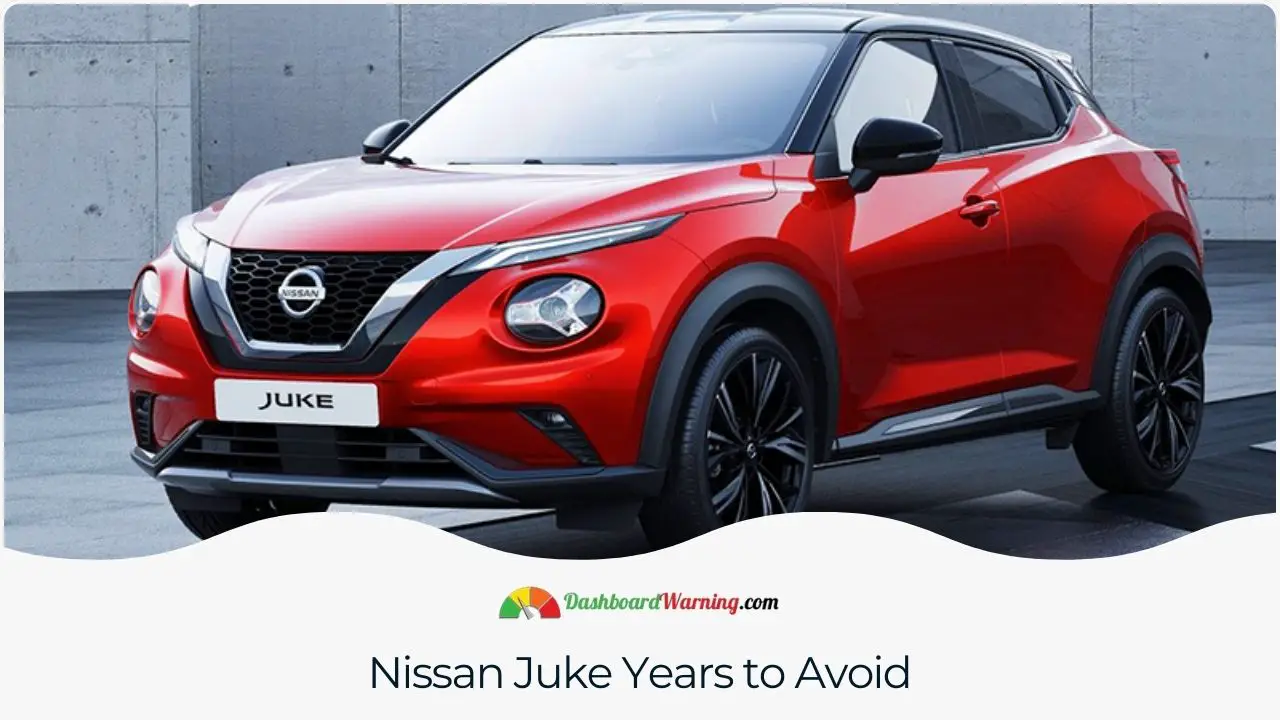
More important content about Nissan
Nissan Sentra Years To Avoid?
Nissan Murano Years to Avoid - 6 Worst Years
Nissan Master Warning Light (Causes And Solutions)
Forward Emergency Braking Light on Nissan Rogue
2008 Nissan Altima Dashboard Symbols
Tips and Advice
Porsche Cayenne Years To Avoid
Subaru Legacy Years To Avoid - 5 Worst Years
Pt Cruiser Years To Avoid
Use 5w30 instead of 0w20 - Advantages and Disadvantages
Tractor Dashboard Symbols And Meanings
Suzuki Sx4 Years To Avoid - 5 Worst Years